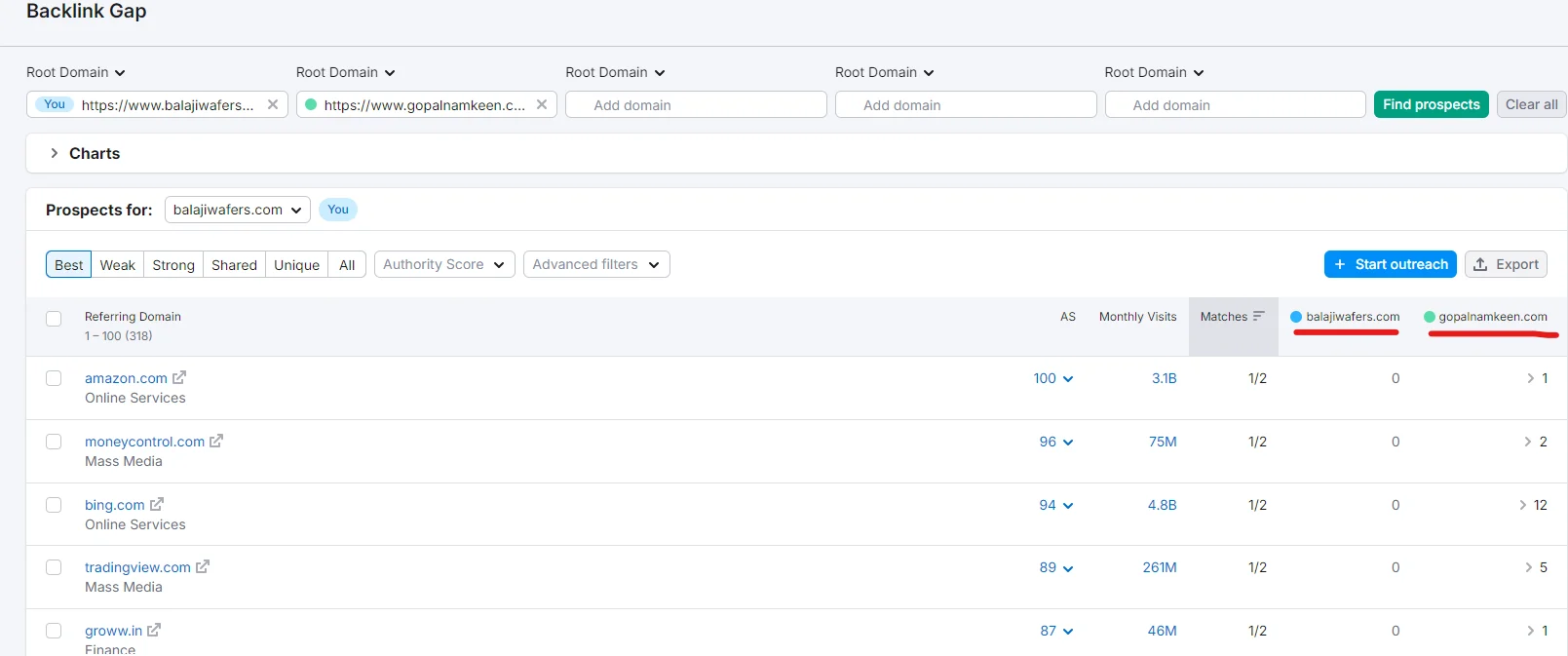
Working on a new category is always thrilling. You are researching, trying different things and so on, but you can also feel lost.
Because research takes up most of your time and you realise there’s nothing really happening.
Well, it’s natural. Don’t stress too much about it. Just learn from the right resources and you will be fine.
Read this blog to understand SEO for FMCG brands, why is it important and some strategies you can star implementing right away.
Let’s get started
Table of contents
- What Does SEO Look Like for FMCG Brands?
- Why is SEO Important for FMCG Brands?
- SEO Strategies for FMCG Brands
- Conclusion
- Frequently Asked Questions
What Does SEO Look Like for FMCG Brands?
FMCG brands operate differently from other sectors, with products that are low-cost, have high demand and short purchase cycles.
SEO for FMCG brands needs to be fast, scalable and laser-focused on quick conversions.
Unlike other industries where building domain authority over time can be a long-term play, FMCG brands need to rank high on search results consistently—because their customers make fast, low-involvement purchases.
Unlike niche products that people spend weeks researching, FMCG purchases are typically decided in minutes. Customers will often compare brands quickly before making a purchase. This means your SEO strategy needs to capture their attention in that brief window. But what does that look like practically?
- Product-centric keywords: Your keyword strategy must revolve around specific products, ingredients or benefits. For example, someone searching for “best anti-dandruff shampoo” isn’t just interested in the brand— they want specific solutions.
- Short purchase cycles: FMCG brands must focus on local SEO and transactional search queries. Queries like “buy soap online” or “detergent near me” need to be the core focus of your SEO efforts.
- High demand for speed and usability: User experience and technical SEO play a huge role here. Since FMCG brands deal with high-traffic sites, ensuring that your website is mobile-friendly and fast-loading is critical.
Why is SEO Important for FMCG Brands?
Given the massive competition in the FMCG sector, here’s why they need an FMCG digital marketing agency.
- Increased Visibility and Brand Awareness: When customers search for products in your category, you need to be one of the first options they see. SEO helps FMCG brands rank higher in search engine results, giving them more visibility and the chance to become the top-of-mind choice.
- Capturing the Right Audience at the Right Time: With the rise of e-commerce, more and more FMCG purchases are happening online. FMCG brands that are optimised for local and mobile search are more likely to capture these customers as they search for products on the go.
- Long-term ROI: While FMCG brands may focus on quick wins through paid advertising, SEO offers long-term benefits. Once your website ranks well for specific keywords, you’ll enjoy sustained traffic without constantly paying for ads.
- Building Trust and Credibility: Appearing at the top of search results isn’t just about visibility—it also builds trust. Consumers are more likely to trust a brand that appears organically in search results versus one that only shows up in paid ads.
SEO Strategies for FMCG Brands
Now that we’ve established why SEO is critical for FMCG brands, let’s get into the specific strategies that can help your brand rise to the top of search engine results.
1. Do Keyword Research In The FMCG Way
FMCG brands need to take a more nuanced approach. In FMCG, you’re not just targeting head terms like “buy toothpaste” or “best shampoo.” It’s about understanding user intent and creating a keyword strategy that caters to informational, navigational and transactional queries.
Tools You Can Use:
- Google Keyword Planner
- Semrush
- Ahrefs
For instance, consumers looking for a product like “organic detergent” might search for terms like:
- “best organic detergent for sensitive skin”
- “chemical-free detergent for babies”
- “organic detergent near me”
Your keyword strategy should include both broad and long-tail keywords, focusing on specific attributes like “organic”, “sensitive skin” and “chemical-free.” You’ll also want to localise keywords for Indian cities. For instance— “best organic detergent in Ahmedabad” can give your SEO a massive boost.
If your brand sells region-specific products, targeting localised content can significantly improve your ranking in searches within that city. For instance, an FMCG brand offering authentic Gujarati snacks should use local keywords like “buy Gujarati snacks in Ahmedabad.”
2. Optimise Content and Product Pages
In FMCG, product pages are gold mines for conversions. They need to be optimised not only for search engines but also for user experience.
Here’s a breakdown of the on-page SEO elements that deserve your attention:
Title Tags & Meta Descriptions
Your title tags should incorporate the main keyword and be within the 50-60-character range. Similarly, the meta descriptions should give a brief but compelling reason why users should click through, making sure you include the keyword naturally.
For example, if you’re selling a personal care product like a moisturiser, an effective title tag could be: “Buy Natural Moisturiser for Dry Skin – 100% Organic”
Meta Description: “Discover our all-natural moisturiser for dry skin. Made with organic ingredients, perfect for daily use. Available now in Ahmedabad.”
Headings and Subheadings
Using H1, H2 and H3 tags effectively will help both search engines and users understand the structure of your content. A simple heading structure with keywords like “Best Moisturiser for Dry Skin” ensures Google crawlers recognise the main topic of your page.
Internal Linking
Internal linking is a powerful yet underutilised SEO element. FMCG brands often have hundreds of products and internal linking can help spread link equity. Linking to related products or blog posts (like a guide on skincare routines featuring your products) helps Google crawl your site better while also providing value to users.
Optimising Product Descriptions
Your product descriptions should be informative but also SEO-friendly. Avoid keyword stuffing; instead, focus on naturally incorporating relevant keywords. A good description should answer questions like:
- What’s the product made of?
- Why should someone use it?
- How does it solve a specific problem?
3. Collaborate with Bloggers and Relevant Websites to Earn Backlinks
Earning quality backlinks from reputable industry sources can significantly improve FMCG brands’ domain authority and search rankings.
Try to first find the backlink gap using the Semrush Tool.

Consider collaborating with influential bloggers, food critics or even local Ahmedabad influencers to create valuable content that links back to your website. You could also contribute guest posts to high-authority websites in the FMCG or retail sector.
Additionally, ensure your brand is listed in local directories like Google My Business, Justdial and Sulekha. These listings will boost your local SEO efforts, helping you appear in local searches for relevant FMCG products.
4. Provide Valuable Information With Content Marketing
One of the most effective ways to drive organic traffic to your FMCG brand is through a robust content marketing strategy. This goes beyond just writing blogs; it involves understanding what your customers are searching for at different stages of the buying journey.
Create Informative Blogs
While most FMCG brands focus on product descriptions, informative content can help capture a wider audience. Write blogs that answer consumer questions, such as:
- “What are the benefits of using organic hair care products?”
- “How to make healthy snacks at home?”
These types of content not only build brand authority but also give you more opportunities to rank for long-tail keywords.
Leveraging Video and Visual Content
In the FMCG sector, visual content plays a massive role in influencing purchase decisions. Whether it’s product demos, customer testimonials or how-to videos, optimising video content for SEO is crucial.
Platforms like YouTube are search engines in their own right, so make sure your video titles, descriptions and tags are keyword-optimised.
5. Combine SEO with Paid Ads
To fully maximise your reach, combining your SEO efforts with paid advertising can deliver excellent results. While SEO focuses on long-term organic growth, paid ads provide quick wins by placing your products at the top of search results.
By running Google Ads alongside your SEO efforts, you can dominate both the paid and organic sections of the search engine results page (SERP).
This dual visibility increases trust and drives higher click-through rates. Ensure your PPC campaigns focus on high-intent keywords, while your SEO efforts capture the more informational, long-tail keywords.
6. Track SEO Metrics
Finally, tracking and measuring the success of your SEO efforts is crucial for continuous improvement. For FMCG brands, focusing on metrics such as organic traffic, conversion rates, bounce rates and keyword rankings will help you understand what’s working and what needs fine-tuning.
Tools to Use:
- Google Analytics for tracking traffic and behaviour.
- Google Search Console for monitoring search performance.
- Semrush and Ahrefs for keyword tracking and backlink analysis.
To learn more about the strategies, connect with peers working at an SEO company. Because talking to someone about a problem always helps especially when they have already solved it once.
Conclusion
SEO for FMCG brands requires a fine balance between immediate wins and long-term growth. By focusing on tailored keyword research, on-page and technical SEO, content strategy and combining your SEO efforts with paid ads, you can dominate the competitive FMCG. Whether you’re optimising product pages or leveraging local SEO, these strategies might help you stay ahead of the competition.
As always, implementing these strategies consistently and monitoring your performance over time will be key to driving sustained growth.



